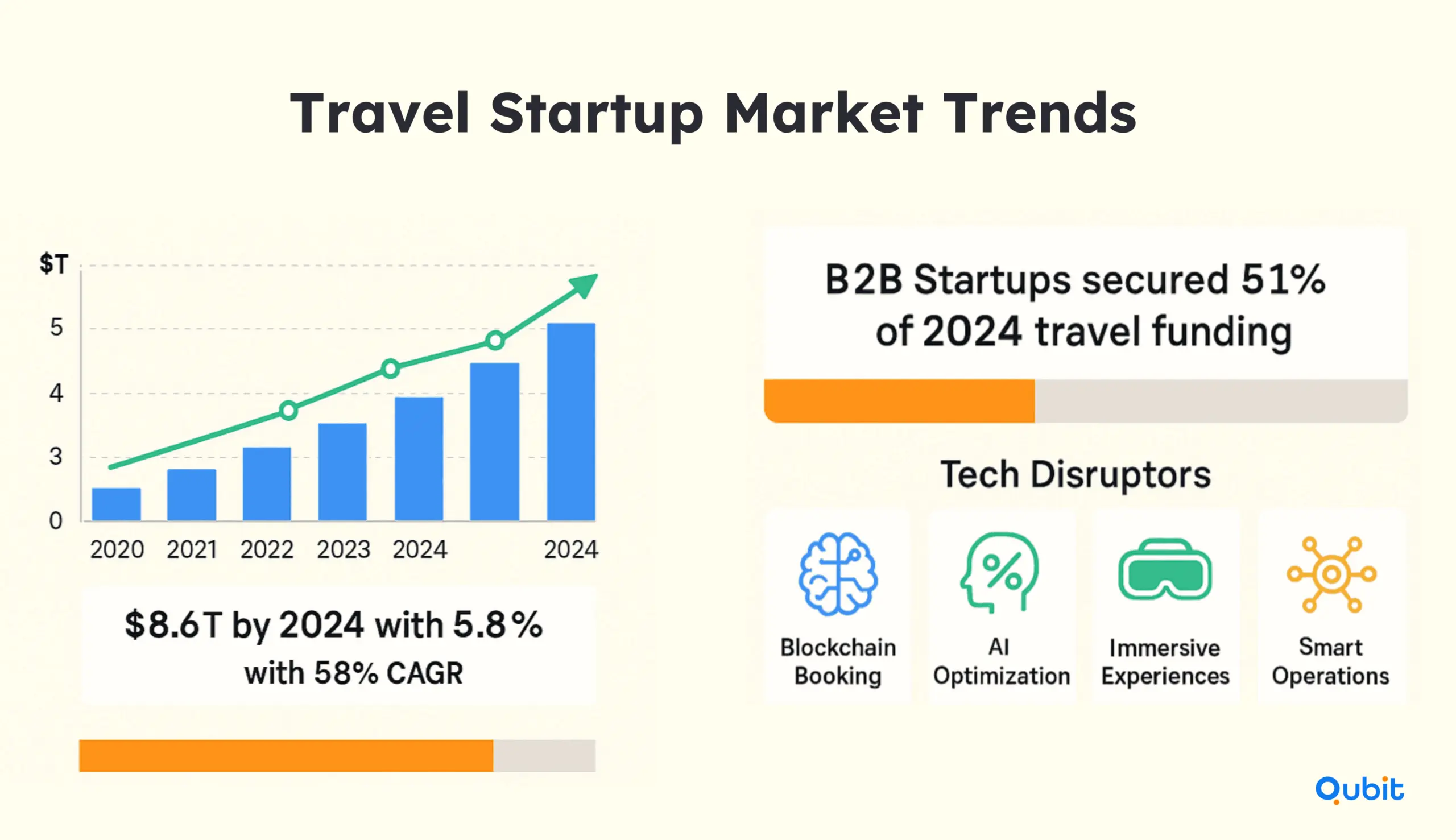The travel startup ecosystem is evolving rapidly, driven by innovation and shifting consumer demands. For entrepreneurs in this space, securing funding and strategic partnerships is critical to scaling operations and staying competitive. Corporate venture strategies offer unique opportunities for travel startups to access resources, mentorship, and market insights from established industry players. These collaborations can accelerate growth while minimizing risks associated with traditional funding models.
You encounter a comprehensive framework in travel startup fundraising strategies that sets the stage for understanding the wider funding landscape for your venture. By exploring corporate venture options, travel startups can unlock pathways to success in a dynamic market. Let’s dive into how these strategies can reshape the future of travel entrepreneurship.
Travel Market Analysis and Trends

The global travel industry is experiencing a remarkable recovery, with projected revenues reaching $8.6 trillion by 2024, growing at an annual rate of 5.8%. This resurgence is driven by shifting consumer behaviors post-pandemic and a renewed investor focus on B2B travel startups, which accounted for 51% of travel-specific funding in 2024.
Blockchain, artificial intelligence (AI), immersive technologies, and the Internet of Things (IoT) are revolutionizing the travel industry. Blockchain facilitates decentralized booking systems, ensuring secure transactions. AI optimizes personalization and efficiency in travel services. Virtual and augmented reality (VR/AR) offer immersive previews of destinations, while IoT enhances operational processes for seamless experiences.
Journey Ventures is reshaping the travel investment landscape by supporting innovative startups. Recent investments include Wenrix, UpStay, and Roomerang LTD, all of which focus on technology-driven solutions for the travel industry. Explore the Journey Ventures Case Study to understand how travel-focused investors select portfolio companies.
What is Corporate Venture Capital?
Corporate venture capital refers to investments made by established corporations into startups, usually aligned strategically with their business goals or industry focus. For travel startups, partnering with corporate ventures often provides more than just financial backing—it opens doors to strategic resources, customer networks, technological support, and market expertise.
Why Corporate Venture Capital is Ideal for Travel Startups
The travel industry thrives on innovation, scale, and customer-centric experiences. Corporate venture capital uniquely addresses these factors by:
1. Accessing Industry Expertise and Market Insights
Corporations investing in startups typically bring deep industry knowledge and extensive networks. They provide startups with invaluable market insights, helping them swiftly identify trends, customer behaviors, and operational best practices.
2. Accelerating Market Entry and Scaling Operations
Travel startups partnering with corporates gain access to existing customer bases and marketing channels, facilitating rapid growth. Strategic collaboration significantly reduces the go-to-market timeline, enhancing competitive positioning.
3. Leveraging Technology and Innovation
Corporations frequently have dedicated innovation teams and advanced technology resources. Startups partnering through corporate ventures can tap into sophisticated technology platforms, research facilities, or product testing opportunities.
Strategic Benefits of Corporate Venture for Travel Startups
Corporate venture partnerships offer clear strategic advantages:
- Enhanced Credibility: Aligning with established brands builds instant credibility with customers, suppliers, and other investors.
- Operational Support: Startups gain access to supply chains, operational expertise, and mentorship from industry veterans.
- Reduced Risk: Corporate backing mitigates market entry risks, offering stability and guidance that purely financial investors may not provide.
Steps to Secure Corporate Venture Funding
Here’s how to effectively pursue and secure corporate venture capital:
Step 1: Align Your Value Proposition with Corporate Goals
Understand potential corporate partners' strategic objectives and clearly demonstrate how your travel startup complements their business strategy, whether through technological innovation, customer experience enhancement, or sustainability initiatives.
Step 2: Prepare an Investor-Centric Pitch
Develop a pitch specifically targeting corporate ventures, emphasizing strategic synergies and mutual benefits. Clearly communicate how your startup’s innovation will add value to their existing products or services.
Step 3: Identify Suitable Corporate Partners
Research and shortlist potential corporate venture investors whose business goals align with your startup’s vision. Consider established travel companies or adjacent industries like airlines, hospitality giants, or global tour operators.
Examples of Notable Corporate Venture Firms for Travel Startups
Understanding prominent players can help you identify ideal partners:
JetBlue Technology Ventures
JetBlue’s corporate venture arm invests in startups focused on aviation technology, customer experience innovation, and sustainability. Partnerships typically involve substantial strategic collaboration, not merely financial backing.
Thayer Ventures
A dedicated travel and hospitality investor, Thayer Ventures strategically supports technology-driven startups aimed at transforming the travel sector through innovation.
Hangar 51 (IAG)
British Airways’ parent company, International Airlines Group (IAG), operates Hangar 51, a corporate accelerator providing startups access to its airline network, operational expertise, and potential partnership integrations.
Fifth Wall
Fifth Wall connects innovative travel and hospitality startups with leading corporates, leveraging strategic investments to transform traditional experiences into digitally enhanced environments.
Winning over sector-focused VCs? This travel startup investor strategy guide distills positioning, proof points, and timing so your outreach hits.
Navigating the Challenges of Corporate Venture Partnerships
Despite their advantages, corporate venture partnerships come with unique challenges:
- Alignment of Interests: Ensuring ongoing alignment of business goals is critical to avoid conflicting objectives.
- Operational Integration: Balancing autonomy while integrating effectively with corporate partners requires careful negotiation and clear agreements.
- Cultural Compatibility: Navigating differences in corporate versus startup cultures necessitates clear communication and aligned expectations.
Carefully addressing these areas upfront fosters productive and lasting partnerships.
Best Practices for Successful Corporate Venture Collaboration
Maintain Clear Strategic Communication
Regularly align on objectives, clearly communicating expectations, progress, and changing conditions. Transparent communication strengthens mutual trust.
Define Milestones Clearly
Agree upfront on measurable goals, timelines, and roles. This clarity prevents misunderstandings and helps manage partnership dynamics effectively.
Leverage Mentorship and Resources
Actively utilize the expertise and resources your corporate partner offers—network introductions, technical mentorship, or operational guidance.
Conclusion
Corporate venture capital offers a unique opportunity for travel startups to secure funding while gaining access to strategic resources and industry expertise. Throughout this post, we’ve explored key strategies, such as aligning with investor goals, understanding market trends, and building scalable business models, to maximize the potential of such partnerships. These actionable insights can help startups position themselves effectively in a competitive market.
If you’re looking to turn CVC interest into strategic lift, at Qubit we understand partner fit, pilot design, and commercialization timelines. Align capital with long-term value through our travel fundraising assistance and map your CVC game plan.
Key Takeaways
- Leverage corporate venture strategies to scale travel startups effectively.
- The travel market is rebounding with significant growth forecasts.
- Emerging technologies like AI, blockchain, and IoT offer competitive advantages.
- Targeted funding strategies are crucial in the evolving travel ecosystem.
- A clear, narrative-driven approach can attract the right investors.
Frequently asked Questions
What are the top venture capital firms for travel startups?
Leading firms include Journey Ventures, along with other investors specializing in tech-driven travel investments.






